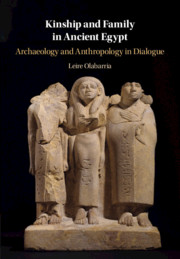Book contents
- Kinship and Family in Ancient Egypt
- Kinship and Family in Ancient Egypt
- Copyright page
- Dedication
- Contents
- Figures
- Acknowledgements
- Map of Egypt
- Part I Ancient Egyptian Kinship in Context
- One Introduction: Ancient Egyptian Kinship between Relatedness and Material Agency
- Two Understanding the Sources
- Three Setting the Terms
- Four Between the Emic and the Etic
- Five Dynamising Kin Groups
- Part II On Koinographic Analysis
- Appendix: ANOC Table
- Notes
- Bibliography
- Index
Four - Between the Emic and the Etic
Kin Groups in Ancient Egypt
from Part I - Ancient Egyptian Kinship in Context
Published online by Cambridge University Press: 26 February 2020
- Kinship and Family in Ancient Egypt
- Kinship and Family in Ancient Egypt
- Copyright page
- Dedication
- Contents
- Figures
- Acknowledgements
- Map of Egypt
- Part I Ancient Egyptian Kinship in Context
- One Introduction: Ancient Egyptian Kinship between Relatedness and Material Agency
- Two Understanding the Sources
- Three Setting the Terms
- Four Between the Emic and the Etic
- Five Dynamising Kin Groups
- Part II On Koinographic Analysis
- Appendix: ANOC Table
- Notes
- Bibliography
- Index
Summary
Chapter 4 presents kin group as an etic category that we can use to study ancient Egyptian relatedness. Kin group can be categorised as a polythetic class with a number of concurring attributes, not necessarily existing simultaneously. The six attributes that the primary sources reveal for kin groups in ancient Egypt are that they all live in the same household or area; they are displayed and commemorated together on monuments; they can function as and economic units or corporate groups; they are under the authority of one man who acts as the head of the group; they are buried together or close to each other in the same area of the necropolis; and they hold reciprocal duties with living and deceased members of the group.
This definition of kin groups is thus flexible and purely performative, as it based on what a kin group does rather than on what it is supposed to be. The main attribute is arguably display and commemoration, because most of the sources tend to be monumental in nature, representing an idea of the group that Egyptian themselves were trying to transmit to their contemporary and future audiences.
Keywords
- Type
- Chapter
- Information
- Kinship and Family in Ancient EgyptArchaeology and Anthropology in Dialogue, pp. 75 - 95Publisher: Cambridge University PressPrint publication year: 2020

